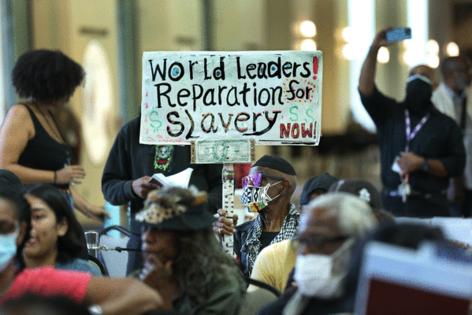Reparations panel calls for cash for Black St. Louisans. How much? Still unclear
Published in News & Features
ST. LOUIS — City Hall should cut checks to Black residents as reparations for slavery and anti-Black discrimination, a city panel has decided.
But the Reparations Commission didn’t say how much recipients should get, leaving a key issue up in the air as the group prepares to send final recommendations to Mayor Tishaura O. Jones on Oct. 7.
Instead, the panel recommended the formation of another committee.
“What we have decided as a commission is to set forth a cash payment process that is equation-based,” commission Chair Kayla Reed said Monday. “But that equation isn’t formalized.”
The commission is poised to recommend several other policies to compensate for damage done to Black communities by city policy over the decades, including programs offering scholarships to Black children, housing to Black families and grants to Black-owned businesses. Several of the ideas would build on recent city initiatives sparked by Jones’ push to spend much of the city’s federal pandemic aid in heavily Black north St. Louis.
But the lack of immediate details on cash payments stuck out at the commission's meeting Monday night.
“This commission has taken 18 months to get to this point,” said King Ausar, who’s followed its work. “And now you’re talking about another commission to get together and do some more talking.”
Getting reparations in cash, unfiltered by bureaucracy, has been the focus of reparations debates in other cities and states as well as Congress for years now.
Jones raised the issue in the executive order that formed the commission in November 2022 when she called out the U.S. government’s reparations to Japanese Americans incarcerated during World War II, an exercise that included sending $20,000 checks to surviving detainees in the late 1980s and early 1990s.
The people who attended the St. Louis commission’s meetings over the past year and a half have repeatedly hammered on the need for direct payments on a large scale.
More than once, a speaker rose near the end of a long meeting filled with discussions of local history and reminded commissioners that many people were just waiting for their checks.
With its mayoral mandate expiring this week, commissioners proposed a way forward: the creation of a new Reparations Commission to do the math on how much people should get, and then to oversee the payments and other new programs.
But some in the audience Monday night were restless.
“Does it take this amount of time for any other peoples that are in need to get their just due?” asked Ausar. “And if not, why is it taking so long for us?”
The question drew the most applause of any line uttered Monday night.
Reed, the commission chair and a leading political activist in the region, said the answer was that the commission didn’t have the financial expertise to weigh all of the factors that could affect the size of a payment.
The commission is calling for reparations not just for people who can trace their lineage back to slavery, but any Black residents disproportionately impacted by systemic racism in St. Louis. Measuring the extent of the impact of city policy on each eligible person — and the corresponding size of the payment — is complicated, Reed said.
“We didn’t want to draw a number out of the air,” she said.
Commissioners also noted some uncertainty about where the money for payments and programs would come from. The city has yet to spend a significant portion of its $500 million federal pandemic aid haul, and hasn’t touched its $250 million share of the NFL Rams relocation settlement.
But none of the money has been set aside for reparations, and the volunteer commission has no power to make spending decisions.
“We are wrestling with the fact that there absolutely must be cash payments,” Reed said, “and also that we’re not sure where that will come from because we can’t guarantee that that will happen.”
Will Ross, a commissioner and a professor at Washington University’s medical school, echoed experts who say federal action will likely be needed to cover the cost.
But Reed urged attendees to organize and put pressure on local officials to adopt the report’s recommendations and advance the larger mission.
“We need folks demanding that this gets as much consideration as much as blanket phrases like ‘economic development of downtown,’” she said.
The mayor, the city comptroller and half of the city’s aldermen are up for re-election in the spring, Reed noted.
“Decision-makers have to answer your questions to earn your vote,” she said.
The mayor’s appearance follows some criticism about the lack of attendance at the commission’s meetings from elected officials.
Rep. Justin Sparks’ bill would ban taxpayer-paid reparations “on the basis of race, religion, gender identity, sexual orientation, or economic class.”
“I don’t think they care if the community shows up,” one activist said.
_____
(c)2024 the St. Louis Post-Dispatch Distributed by Tribune Content Agency, LLC.







Comments